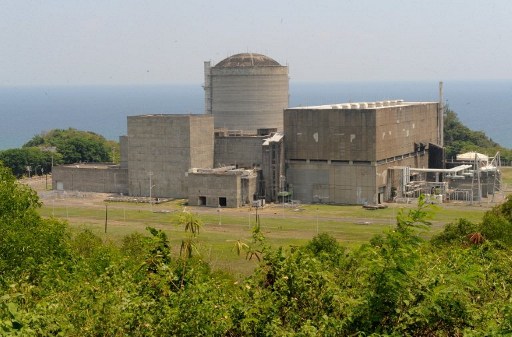Nuke plant rehab entails unbearable costs, green group warns
A green group on Sunday warned President Rodrigo Duterte of the “unbearable” monetary and environmental costs of reviving the mothballed Bataan Nuclear Power Plant.
Kalikasan People’s Network for the Environment said the $1 billion rehabilitation cost proposed by the Department of Energy was just the “tip of the iceberg” compared to the state of nuclear waste management technology and various physical and technical risks surrounding the 621-megawatt nuke plant in Morong.
“We rebuke and deplore Pres. Duterte’s approval of the proposed BNPP rehab under the false premise of Sec. Cusi that the safety and security of the BNPP will be ensured. While we recognize Duterte’s consistent concern over the BNPP’s safety risks, the project is replete with proven geological, infrastructural, and environmental risks that will likely entail unbearable costs. It is the Filipino people who will ultimately pay the price of these massive risks with billions in wasted taxpayers’ money, or worse with their lives,” Kalikasan PNE national coordinator Clemente Bautista said in a statement.
READ: Duterte gives nuke plant green light
“When Sec. Cusi promised to Pres. Duterte that the DOE will undertake strict measures to ensure the safety of the BNPP, it is a promise of the burden of billions of dollars in additional costs. In the United Kingdom, the cleanup cost in one nuclear waste dumpsite already runs up to the $155 billion mark. In Germany, four nuke power companies are being made to pay $26.4 billion in additional costs for long-term storage of radioactive nuclear waste. This does not even include the costs that will be entailed by the worsening risks of natural hazards surrounding the BNPP,” Bautista added.
Article continues after this advertisementCusi said Duterte has given the green light to rehabilitate the nuclear plant—a major turnaround from his earlier rejection of using nuclear energy—but noted the President’s serious concerns over safety.
Article continues after this advertisementThe environmental group also called the nuke plant a “Marcosian curse” that “serves to rehabilitate the dark, fascist legacy of the dictatorship.”
“Filipino taxpayers are still paying P27 million annually for the upkeep of this project that only enriched the Marcoses and their crony contractors. We must repudiate this costly historical revisionism and put an end to all attempts to rehabilitate the Marcoses and especially this radioactive legacy of theirs,” Bautista said.
“We strongly counsel Duterte to focus on building our state’s technical capacities for energy development and management. Duterte should also prioritize the wise utilization of our clean and indigenous energy resources. This will ensure that our energy development pathway leads to national industrialization, self-sufficiency, and environmental sustainability. Duterte should decisively stop perpetuating the Marcosian curse of the BNPP,” Bautista added.
The late dictator Ferdinand Marcos decided to build the $2-billion plant at the height of the 1973 oil crisis. It was completed and ready for operation in 1984, but never opened after a decade of construction due to safety concerns. Former President Corazon Aquino mothballed the nuke plant in 1986 in the wake of a nuclear fore at the Chernobyl power plant in Russia. JE/rga
RELATED VIDEO
